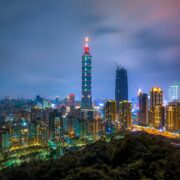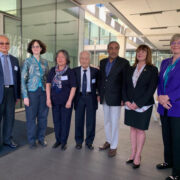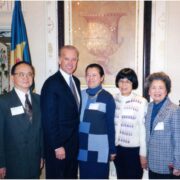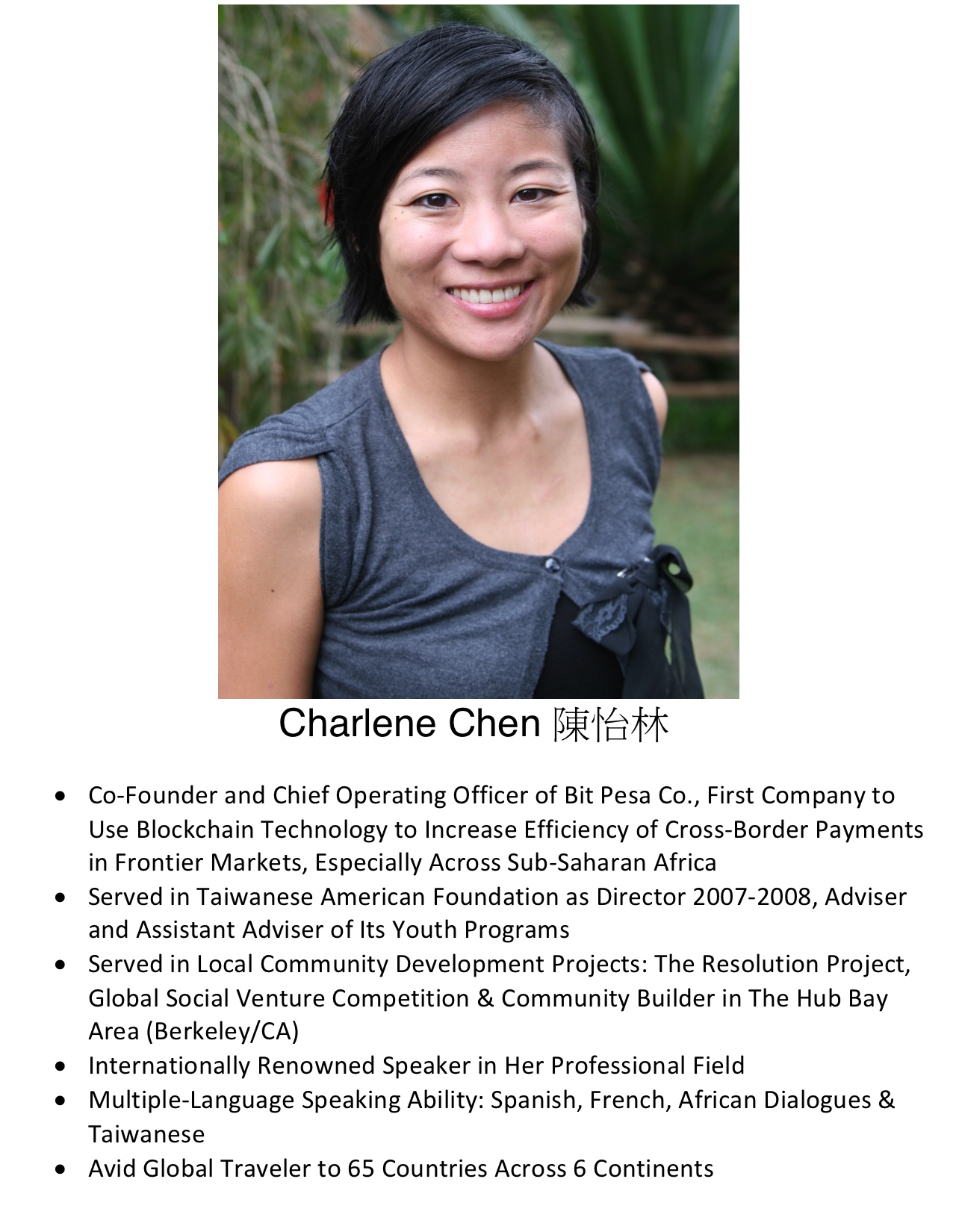
Community Services and Entrepreneur 01/02/2018
一位台美人第二代在非洲的故事
走出溫室,挑戰未知 -Beyond the Comfort Zone
Charlene Chen 原作 陳東榮 譯

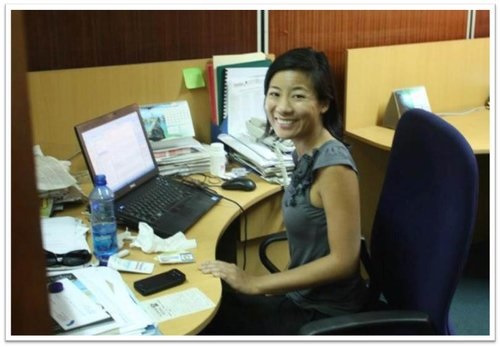 Charlene’s speech at the NATWA convention 2013
Charlene’s speech at the NATWA convention 2013
1972年,我的父母離開他們的家鄉,來到美國開始了新生活。就像您們這羣第一代的台美移民,離開了親人,朋友,故鄉,來到異鄉,大家為的就是希望替您們甚至尚未出生的孩子們,找到一個能夠得到最好的成長,求學,就業及發展的地方。請問大家,那時候的您們,最希望您們的孩子,將來長大以後要做什麼樣的職業?
我相信大部份的亞裔父母們,都希望他們的孩子們成為醫生,科學家,律師,教授,或其它崇高的職業。我敢很確定地說,包括我自已的父母,您們做夢也不會想到,也許有一天,您們的的孩子竟然會放棄「美國夢」,跑到遙遠落後的非洲去工作。今天,我很榮幸地有這個機會來向各位報告,為什麼我會走出我舒適的安樂窩,到非洲去?
其實,我本來走的也是一條相當台灣人傳統的成長過程。我父親愛好科技,又是電腦高手。受到他的影響,我在高中時就選了電腦程式課程,後來在杜克大學(Duke University)也以電腦科學及心理學雙修畢業。在學四年中的每個暑假,我都到 Microsoft, Eli Lilly大藥廠以及當時非常熱門的網路創業公司去實習。
大學畢業後,我在Deloitte顧問公司當了四年的系統分析師(Systems Analyst)。Deloitte是世界最大的專業顧問公司之一。這段期閰,我每星期都來回各大城巿,住的是舒適的旅舘,過的是多彩多姿的城巿生活,還嘗盡了各色各樣,豐美的飲食。我與一羣傑出的同事,優秀的主管,快樂相處, 像一個大家庭。 做的是為Fortune 500的各大公司設計,執行他們委託的任務。這段時間,我過的確實是一種令人羨慕,優逸舒適的生活。但是,我總有一種缺了什麼的感覺。沒錯,我喜歡我的工作,但我覺得這種拼命追求商業利益的工作,似乎沒有真正地幫助別人。所以我開始在我工作之外,花了很多時間,去一些非營利機構當義工。我參加了”亞裔姐妹參與卓越團–ASPIRE (Asian Sisters Participating In Reaching Excellence)”, 帶領一羣大學及中學的亞裔女生們,教她們如何在將來能夠發揮工作及領導的潛能, 在波士頓的中國城社區中心,我也為亞洲移民設立了一個電腦訓練課程。我也參加了台美基金會(TAF) 每年舉行的夏令營,這是很多台美人第二代都參加過的。我從一個營地輔導員,做到節目主任。這個夏令營主要是促進台美人第二代對自我的認同及成長。雖然我在籌劃及執行過程中,也曾經遭遇到一些挑戰,但這種志願性的工作,卻讓我體會了人生的真正價值。
隨著歲月的流逝,我內心的那一點聲音越來越響亮 。我開始發覺,假如我能找一個既可謀生,又能為社會服務的工作,那我的社會服務就不必只限於在晚上和週末,可以兩全其美了!於是,我開始想到離開Deloitte 公司。我先是開始申請加入美國和平部隊(Peace Corp), 但後來我又想,應該先拿個企管碩士(MBA),我的基礎教育才算完整。因為在資訉技術方面, 我雖然學有專長,但在有關財務,會計,供應鏈,市場營銷,銷售,以及人力資源方面,我都是外行。所以我就進了加州柏克萊大學(UC Birkerley)企業管理碩士班(MBA)。這樣子, 將來我就有三條不同的路可以選擇:美國國內非營利機構的管理,企業兼社會責任性的公司,或者去發展中國家從事企業及科技的開發。企管系的學生,常常會利用暑期實習,先去實際體驗他想做的工作, 這樣子他才能早點發現,他是不是適合做一個華爾街的銀行家?或是能在非洲住下去?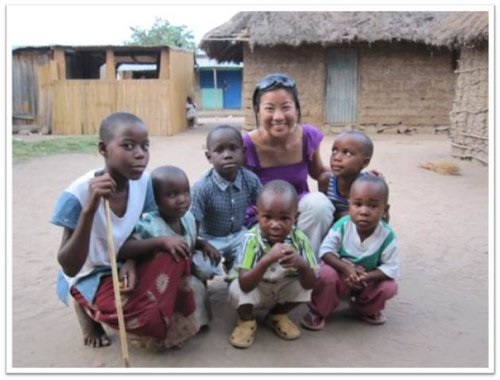
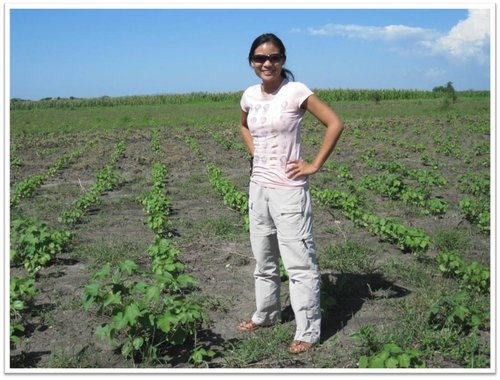
從小, 我就很幸運地能跟著父母到各地旅行,但都是到歐洲,亞洲一些己開發的國家。我第一次真正看到貧窮,是跟著教會去墨西哥及瓜地馬拉的農村。但是, 我從來沒去過非洲,甚至從沒聽過誰去過非洲?我只知道西方國家, 在幾十年來花了很多錢來賑濟非洲,卻不見效果。我對於Social Entrepreneurship(社會關懷性的企業經營) 開始感到興趣,Social Entrepreneurship就是以造福社會為目的來經營的企業。它的特色就是, 經營的目的不是為自己或股東爭取財富,而是為幫助窮人或弱者。但是為了能擴大影響力及維持永續的效果, 公司也要同時兼顧自已的合理利潤及生存。這種經營方式必須要鼓勵窮人的自發參與,而不是給予伸手就有的單向施捨。就像甘地說的 "您給的越多,他就伸手要的更多"。結果, 我就決定去非洲看看。在第一個暑假的實習時,我去了西非的迦納。現在,我想請問各位,您們想像中的非洲,是甚麼樣的地方?貧窮?饑荒?,疾病?愛滋病?戰爭?貪汚…。坦白說,這也是我去非洲以前的印象。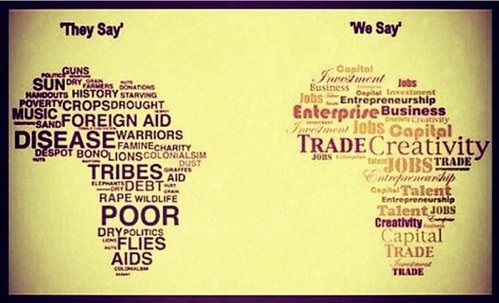
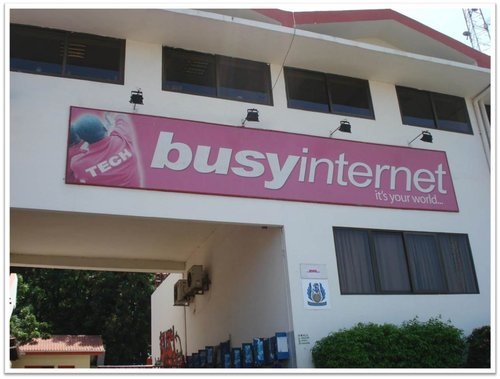
我在迦納的首都安克拉,協助當地人創設的一家互聯網路公司
但是經過了三個月,我在迦納(Ghana)的首都安克拉,協助當地人創設了一家互聯網路公司之後,我開始看到了非洲企業界的潛力和前途,包括創業,造就工作機會, 投資及人才資源等等。不僅在金融方面的-銀行及迦納股票交易中心有許多經營的機會,我也接觸到很多迦納的經營者,他們大多是白手起家的。後來我也在烏甘達(Uganda)實習過。在那裏,我跑到邊遠的小農村去,教農民們怎麼使用收音機及簡單的手機。我也曾經花了五個月,在坦桑尼亞(Tanzania)教農民們,怎樣用手機來查詢棉花的市場價格,免得因市場價格的信息不明,被棉花的商人任意剝削,欺騙。
這些經驗,給我的印象太深刻了,所以我在柏克萊畢業以後,就決定到非洲去工作。當時, 在約旦,奈及利亞及南非都有工作給我,但我終於選擇 了肯亞的KickStart International 。這是一家社會關懷性的企業公司(social enterprise)。所謂社會性企業公司, 就是它的營業目標是要幫助弱勢, 例如銷售可以幫人增加收入的工具,來幫助農人走出貪窮。而不是僅僅追求自已的商業利益。KickStart是第一個利用銷售,而不是白送商品,來幫助窮人的非營利機構。目前,我們已經賣出了廿一萬五千具人力操作的抽灌水幫浦給非洲的農夫。這些農夫平均擁有一、二公頃的土地,一天的平均收入大約是兩、三塊美金。非洲每年有三個月的雨季,其它時間大都乾旱,所以可以種植的時間有限。但如果農夫買了一台我們的 “MoneyMaker” irrigation pumps("發財小子"抽水灌溉機)以後,他們就不必靠天吃飯了。整年都可以用這不需電力,全用人工,可以抽水又可噴水的幫浦來耕種。當別人沒水灌溉,沒有收穫的時候,這些有抽水機的人卻有蕃茄,白菜拿來賣,並且可以得到更好的價錢。這樣一來,一位每年有美金一百元收入的農夫,就可以增加大概七百五十元的收入。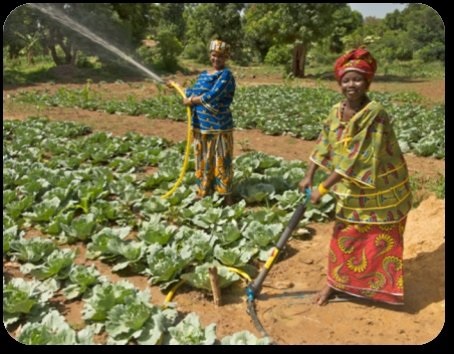
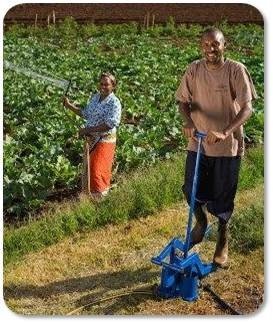
當然, 我在KickStart的工作面臨了不少挑戰,但也有很大的收穫。我們的小型幫浦一具賣美金六十五元,幾乎只是成本,但對非洲的農夫來說,這已經是個大數目了。在我作為產品經理的第一個工作上,我設計了一個金融服務,叫做"Drop by Drop, Buy a Pump” (一點一滴,買個"發財小子")。也許你不相信,在許多發展中的國家,有些技術的使用已經超越了開發國家。在肯亞,很少人在家裏面有固定的電話,更不用說有什麼筆記本電腦了。但是超過70%的肯亞人卻至少擁有一台手機。他們不僅用自己的手機打電話和發短信,他們也用自己的手機經過一家名為M-PESA(PESA的錢是斯瓦希里語字)來做金錢的????出和????入。就像我們在網路上存款提款一樣,根本就不必去找銀行。另一方面, 非洲人相信在家人及朋友間有互相借錢的義務,別人一知道您有存錢,馬上會有人來借去。我的方法就是讓有意買抽水機的人一有剩錢,就存到我們的公司,累積到相當的數目才能拿到幫浦。這個方法跟小額貸款(Micro-loan)不同,前者是自已要存了足夠的錢,才能拿到幫浦。不能未勞先獲。這樣來鼓勵他們先有付出才有收穫。這個方法也使得弱勢的婦女們有了圓夢的機會,因為婦女們沒有能力一次拿出全款,也沒有足夠信用去拿到貸款。這個方法讓她們即使財力不足, 但只要有志氣, 靠著時間、毅力,也可達到目的。這就可以激發她們的潛能與自信。
2012 年美國國務院與洛克婓勒基金會設立了一個”促進婦女潛能的創新獎”(Innovation Award for the Empowerment of Women and Girls), 獎勵有創新方案,能為開發婦女潛能做出貢獻的公司。KickStart就是首次獲獎的三家非政府機關(NGO)之一。
不過,在促銷方面,我所面臨的挑戰是,我們的目標客戶,大都居住在邊遠分散的農村裏,所以我們需要花很多的時間和精力去拜訪他們,更不用說要把我們的產品賣給他們了。我也不得不學習他們國家的正式語言–斯瓦希里語,才能跟這些很少說英語的農民溝通。
去年我被晉升為市場營銷和創新的主管。負責管理KickStart的新產品開發,銷售策略管理,及全球營銷和品牌的推廣。對我來說,這已經相當超出了我的經驗,也就是我的舒適區之外了,因為在這方面,我幾乎毫無專長。但我很感激 KickStart看到了我的潛力,給了我這個機會去學習和成長。雖然不是一帆風順,但經過不斷的嘗試與教訓,以及公司中大都是肯亞人的上司及同事的指導及協助,我漸漸地得心應手起來。不過,對我個人來說,在非洲工作令我最難過的,就是離鄉背井,尤其我特別想念我的父母親,兩位姐姐,及六位侄子和侄女們。
今天,我要告訴您們的一個"好消息" !您們不一定要遠到非洲才能走出您的安樂窩!"其實,幾十年前,您們已經比我先走出您們的安樂窩了。您們己經做了很多勇敢的事了。當年,您們離開了親人,朋友,己經建立的事業,以及美麗,熟悉的台灣到北美洲來打拚,絕對也是困難重重的。就像我父親要在醫院裏用他那不高明的英語與人交談,治病。而且在1972年,他們剛到美國時,住在南方阿拉巴馬州的伯明翰(Birmingham, Alabama),那時候,美國還在民權運動的高潮中,他們受到的歧視與孤單,不難想像得到。 相信比我在非洲,被小孩子們在背後叫“Ching-Chong”更難受。而且,您們還要在保存台灣文化及融入西方社會的平衡中掙扎。所以,我先要向您們這些偉大的超越家致敬。不過,我還是要與大家共勉,讓我們繼續走出溫室,四出探索。這裡有五個我用來走出溫室的通道,希望與大家共享。我也希望您用您自己的方式走出您的溫室:
1)不要只走平坥的大道–我已經橫跨6個大洲,走過40個國家和地區,走過、搜尋、欣賞了各地的山水,品嚐了千奇百樣的食物和文化。我的冒險包括在澳洲海岸的大堡礁(Greater Barrier Reef)潛水,探索埃及的的大金字塔(Great Pyramids),攀爬圍繞在秘魯古城馬丘比丘(Macu Pichu)的高山,在贊比亞的維多利亞大瀑布(Victoria Falls)邊緣游泳…。無論是在阿根廷跳一場探戈,在約旦的死海中漂浮,或是在烏干達(Uganda)的的深山中追蹤大猩猩,這些獨特,令人難忘的經驗,都豐富了我的人生。在旅途中,也許您會碰到一些困難,例如您不曉得要到那裏去?看不懂菜單、找不到交通工具, 怎樣討價還價? … 但您可以找到旅遊指南,這些指南,可以告訴您怎樣去做一個省錢的自助旅行,也可以教您怎樣去參加團體旅行?
我一直引以為傲的父母,在這幾年也擴大他們的旅行,他們從亞洲和歐洲的國家開始走到一些比較落後的國家 – 他們已經去過祕魯的馬丘比丘(Machu Pichu),神祕的印度,中國古代所謂西域的中亞細亞(Central Asia),前年,他們還在非洲東部的肯亞(Kenya)和坦桑尼亞(Tanzania)度過了一個月!
2)試騎動物 – 我知道這是比較新奇特別的。 騎上一些稀奇的動物,往往會令人覺得又興奮又緊張, 手忙腳亂。去年,我在肯亞北部參加了一場十公里的騎駱駝競賽,還有塋騎駝鳥時,必須要拼命地抱住牠的背上的鞍架。這些經驗,確實能夠讓您從一個新的層次,重新來體會您週遭的世界。上個月,我還在長頸鹿到處漫步的大公園裏參加了一次騎馬競跑,那當然更是驚險萬分了。
3)海底探險- 作為一個雙魚座(十二生肖的的水象星座的之一)的人,無論是在水上,水中,海底都是我喜愛的地方。這裏是一張我在坦桑尼亞與一條三十呎長的鯊魚同游的照片。水上運動,無論是獨木舟,龍舟競賽,湍流行舟,風帆衝浪(Kite-surf),和水肺潛水(Scuba diving)都讓我有機會去體驗到,占有世界面積70%的海洋。我鼓勵您們,不妨把您們的腳伸入海水裏踢一踢,或者乾脆就跳進海浪裏去。您可以試試簡單的浮潛(Snorkle),也可以試試一個驚心動魄的玩意,那就是把自己????在一個鐵籠中,潛到海底跟鯊魚捉迷藏。這個我還沒試過,但確實想去試看看。
4)嘗試一些對身心的挑戰 – 大約在五年前,我開始決定每年至少要去做一次對自己的挑戰:
2008年- 參加了在舊金山(San Francisco),Nike公司舉辦的婦女半程馬拉松比賽(Semi-marathon)
2009年 – 征服了非洲的的最高峰, Mt. Kilimanjaro ,(19,341英尺)
2010年 – 攀登了非洲的第二高峰,在肯亞的肯亞山(Mt. Kenya)(16,355英尺)
2011年 – 參加肯亞航空公司主辦的Masai Mara的半程馬拉松賽
2012年 – 參加在肯亞的三項全能運動 Triathlon(750米游泳+20公里自行車+ 5公里的競行)
2013年 – 還沒有確定!
也許您不會相信,但我還是那位在中學體育課裏,一聼到要跑一公里就聞之色變的女孩。以前我雖然在學校裏參加過足球及曲棍球比賽,但我從來沒有當過校隊。如果那時您告訴我,我將來會成為一位三項全能(Triathlon)的運動員,即使您說的只是業餘的程度,我也會說您在開玩笑。但是今天,我可以這麼說,任何人只要肯花時間,能用心,有毅力就沒有不可能的事了。當然,運動的挑戰也要考慮到體能的限制,我想至少您可以每天出門散步,或一個月打兩次高爾夫球。
5)走出自我,服務社區–普通的人也可以做不平凡的事。像我媽媽在1999年,台灣九二一大地震時,她和她北美洲台灣婦女協會(NATWA)的姊妹們設立了一個台灣學童協助基金(Taiwanese Students Assistance Fund)。這十多年來她們辛苦募款,細心經營,已經幫助了許多故鄉的弱勢學童。我也很欽佩我的姊姊Grace, 她是一位全職的醫生,又有四個年幼的小孩,但是她仍然抽出時間和精力,三次到海地去救災及醫療傳道。不過,您不一定要千里迢迢地,跑到一個未開發國家才能幫助人。其實,需要幫助的人很多就在我們身邊。
也許您們會問,是什麼讓我走遍世界,不斷地去探索及冒險?我相信,人的生命是我們的親人及上帝給我們的禮物。我們不能不珍惜。只要我還有腳可走,有眼睛可以看,不管前面有多少的挫折,我還是要把每一天過得精彩充實,希望您們也和我一樣。以下是我這一生中想要做到的一些事。
•學會中文
•攀登到西班牙北部的聖地Santiago (一趟30天的長途跋涉)
•攀登到喜瑪拉雅山的攻頂基地
•探險南極洲
•學會駕駛小型飛機
•出版一本書
•成為一位醫生?(爸爸,對不起! 我只是在開玩笑!)
現在,我希望您花個時間,把您一生中最想做的事寫下來,讓我們大家看看。即使這些事情,需要走出您的溫暖窩,最後,我祝福各位,不僅要過您的人生,還要把這個人生, 活得有聲有色,多彩多姿。(Not only to live life, but to live your life ALIVE!)
http://fundly.com/charlene-chen-families4families
Source from Tong Chen
Posted in 04/2015
Beyond the Comfort Zone
Charlene Chen
Charlene’s speech at NATWA convention, 2013 http://youtu.be/PCXVphAOlTs
In 1972, my parents Tong Yong Chen and Feng Feng Lee left Taiwan to start a new life in the United States. They, like all of you 1st generation immigrants, left behind their family, friends and homeland in order to provide their yet unborn children with the best personal, academic, and professional opportunities possible. What did you hope your children would grow up to pursue as professions? Most Asian parents hope that their children will become doctors, scientists, lawyers, or some other prestigious profession… I can pretty much guess that none of you (including my very own parents) dreamed that your daughter would ever leave behind the “American Dream” to work in sub-Saharan Africa. I’m honored to speak to you today about how I left my comfort zone to do exactly that.
Believe it or not, I actually started out on a fairly Taiwanese-approved career path. My tech-savvy father instilled in me a love of computers, so I took my first programming class in high school and ended up majoring in Computer Science (and Psychology) at Duke University. I spent my summers interning at an internet startup, Microsoft, and Eli Lilly, the pharmaceutical company most famous for producing Prozac. I then spent 4 years working as a Systems Analyst at Deloitte Consulting, one of the largest professional services firms in the world. It was a very comfortable life once I adjusted to sleeping in a hotel 3 nights a week and flying every Monday and Thursday – bright colleagues, talented managers, working across multiple industries for Fortune 500 companies. Yet, something was missing – I felt like the work I was doing didn’t really help people. So, I started spending a lot of my free time volunteering with non-profit organizations. I organized career development events for Asian American women in high school and college through ASPIRE (Asian Sisters Participating In Reaching Excellence) and started a computer literacy program for Asian immigrants through the Boston Chinatown Neighborhood Center. I became a camp counselor and eventually Program Director at the annual TAF (Taiwanese American Foundation) Summer Conference, which had had a tremendous impact on shaping my Taiwanese American identity as a high schooler. So while designing and implementing call center applications was intellectually challenging, it was the volunteer work that truly gave me personal fulfillment.
As the years passed by, a little voice inside me grew louder and louder – wouldn’t it be amazing if I could make social impact a part of my day job, not just my nights and weekends. So, I started thinking about leaving Deloitte. Although I started an application to the Peace Corps, I decided to get my MBA in order to round-out my education – I was confident in Information Technology, but knew hardly anything about Finance, Accounting, Supply Chain, Marketing, Sales, Human Resources, etc. I entered business school considering essentially 3 different career paths, domestic non-profit management, corporate social responsibility, or business and technology in developing countries. MBA students who are career switchers often use their summer internship to explore new career paths before committing to full-time opportunities. It would be prudent to discover sooner than later whether or not you can cut it as an investment banker on Wall Street, or say, whether or not you could live in Africa.
I was lucky enough to travel a lot with my family growing up, but mostly to developed countries in Asia and Europe. My first exposure to poverty was through church missions trips to Juarez, Mexico, the Caribbean island of Trinidad, and a village in rural Guatemala. I had never been to Africa and barely knew anyone who had been. All I knew was that billions of dollars of foreign aid was poured into Africa with seemingly very little to show. I was intrigued by the idea of social entrepreneurship, the idea of building organizations with social missions at their core but operating as businesses, not charities. So, I decided to give Africa a shot. I found a summer internship in Ghana, a country in West Africa. Now, tell me what you think of when you think of Africa. Poverty. Famine. Disease. AIDS. Civil war. Political corruption… I confess that these were the words and images that also came to my mind before working in Africa. But after spending 3 months doing SME (small-to-medium enterprise) development for an internet company in Accra, the capital of Ghana, I started to see the potential and positivity in Africa: Business. Entrepreneurship. Job creation. Investment. Talent. I was incredibly inspired by the business opportunities that I found in Ghana. I not only found the formal sector – banks and even the Ghanaian Stock Exchange, but also met impressive Ghanaian entrepreneurs who had literally built businesses from the ground up.
I was so inspired that I decided to move back to Africa after graduating from Berkeley. I first entered development through technology. Through Berkeley, I spent 6 weeks working in rural Uganda researching how small-scale farmers access information using technology as low-tech as radios or as high-tech as mobile phones. Then I spent 5 months working in Tanzania managing a project to allow cotton farmers to receive market prices and ask questions using their cell phones.
After turning down job offers in Jordan, Nigeria, and South Africa, I finally decided to accept a job in Kenya, at KickStart International, a social enterprise whose mission is to lift millions of people out of poverty through income-generating technologies. KickStart was one of the first non-profit organizations to use a market-based approach, meaning that we sell our products instead of giving them away. We have sold human-powered irrigation pumps to over 215,000 smallscale farmers, who on average own 1-2 acres of land and make 2-3 dollars per day. The theory of change is that when a farmer uses our “MoneyMaker” irrigation pumps to irrigate during the seasons of the year when it is not raining, he or she can grow produce year-round, selling tomatoes, cabbages, etc. when demand is high but supply is low. On average, a farmer who was making $100 per year can increase his/her income by $750 in just one year.
Watch: http://www.youtube.com/watch?v=4MI2dJAtfQQ
My work at KickStart has been both incredibly challenging, but also rewarding. In my first role as a Product Manager, I designed a financial service that allows farmers to purchase MoneyMaker pumps using their cell phones. One thing you may not know is that many developing countries have “leapfrogged” in terms of technology. So for example, very few Kenyans have landlines, much less laptops, but over 70% own at least one mobile phone. They not only use their phones to call and send text messages, but they also use their phones to send and receive money using a service called M-PESA (Pesa is the Swahili word for money). Some of the challenges I have faced are that our target customers live on farms in rural areas, so it can take a lot of time and effort to visit them, much less sell them our products. I have also had to learn Swahili, the national language, in order to better communicate with farmers who speak little, if any, English.
A little over a year ago, I was promoted to become the Head of Marketing and Innovation. I currently manage a team of 4 Kenyans to run KickStart’s new product development/global marketing and branding, and sales strategy. This has been quite the stretch role beyond my comfort zone because prior to KickStart, I had absolutely zero experience in any of these subjects. I am thankful that KickStart saw potential in me and gave me the opportunity to learn and grow. It hasn’t been easy, but I have learned so much through trial and error as well as through mentorship from my fellow Senior Managers, nearly all of whom are Kenyan. But personally, the hardest thing about working in Africa has been living so far from home – I especially miss my parents, my 2 sisters, and my 6 nephews and nieces.
So, this is the point in my speech when I thought I would exclaim, “But good news! You don’t have to move to Africa to go beyond your comfort zone! But then I realized that you already have in so many ways. By emigrating from Taiwan to North America, you left behind your comfort zone – your friends, families, and homes. I think about how my father’s medical school books were in English. How my parents immigrated to Birmingham, Alabama in 1971, just after the civil rights movement, and probably faced worse discrimination than I do in Africa, where even small children make “ching-chong” noises at me. I think about how each of you must have struggled to find that delicate balance of assimilating yourselves and your children into American culture while at the same time preserving and passing on your Taiwanese heritage. So, first, we should celebrate this great leap of faith. But I encourage you to continue exploring beyond your comfort zone every day. Here are 5 of the ways in which I have gone beyond my comfort zone, which I hope will encourage you to do the same, in your own way:
1) Travel off the beaten path – I have explored the landscape, food, and culture of over 40 countries across 6 continents. Some adventures have included scuba diving in the Great Barrier Reef off the coast of Australia, exploring the Great Pyramids of Egypt, climbing around the ancient city of Machu Pichu in Peru, and swimming on the edge of Victoria Falls in Zambia. Whether I’ve been tango dancing in Argentina, floating in the Dead Sea in Jordan, or tracking mountain gorillas in Uganda, each trip has enriched my life with unique and unforgettable experiences. It can be frustrating to not know where you’re going, and to struggle to order food, much less figure out what you’re actually eating, but there are countless travel guides that can help you navigate, whether you’re backpacking on a budget or booking an organized tour. And it’s never too late! I’ve been so proud of my parents for expanding their travel from countries in Asia and Europe to less developed countries – in recent years, they have also been to Machu Picchu in Peru, explored India, and spent over a month in Kenya and Tanzania!
2) Ride animals – I know this is an odd one. You might feel a loss of control (I know I certainly did when I competed in a 10 kilometer camel race in Northern Kenya and held on to an ostrich for dear life), but it truly does empower you to see and experience the world around you from a completely new vantage point. Last month, I raced giraffes on horseback, which was literally breathtaking.
3) Explore the deep seas – As a Pisces (one of the water signs of the Zodiac), I love being on water, in water, and under water. Here’s a photo of me swimming with 30-foot whale sharks off the coast of Tanzania. Water sports such as kayaking, dragon boat racing, white water rafting, kitesurfing, and scuba diving have enabled me to explore the 70% of our world that isn’t land. I highly encourage you to dip a toe in the water or just dive right in – you could try something as low-key as snorkeling or intense as cage-diving with sharks. (I haven’t done this but would love to someday).
4) Commit to a physical challenge – about 5 years ago, I decided to do at least one major physical challenge each year:
- 2008 – Ran the Nike Women’s Half-Marathon in San Francisco
- 2009 – Climbed Mt. Kilimanjaro, the highest peak in Africa (19,341 feet)
- 2010 – Climbed Mt. Kenya, the second highest peak in Africa (16,355 feet)
- 2011 – Ran the Kenya Airways Masai Mara Half-Marathon
- 2012 – Competed in 2 sprint triathlons (750m swim + 20km bike + 5km run) in Kenya
- 2013 – To be determined!
Believe it or not, I am the same girl that dreaded running the mile in P.E. class, the same girl who played soccer and field hockey, but never made the Varsity team. If you told me that one day I would be a (very amateur) triathlete, I would have laughed at you. All it takes is time, dedication, and discipline. And a physical challenge should of course be appropriate to your physical ability. Might I suggest committing to walking every day or playing golf twice a month?
5) Reach out to the community beyond your community – Ordinary people do extraordinary things. I’m inspired by my mother, who has tirelessly raised funds to support hundreds of children who were orphaned as a result of the “921” earthquake in Taiwan in 1999. I’m inspired by my sister Grace, who is a full-time physician raising 4 children under the age of 10, but finds the time and energy to do medical missions in Haiti. However, it goes without saying that you don’t have to work in a developing country to serve those in greater need. There are people to serve right here at home. I have always lived by the Gandhi adage that “To whom much has been given, much is expected.”
So, some of you might be wondering what drives me to explore the world and constantly seek adventure? I believe that life is a precious gift from your family and from God, a gift that should never be taken for granted. As long as I have legs to walk and eyes to see, and even when those fail, I will continue to live each day to its fullest, and I encourage you to do the same. Here are some of the things that I would like to do in my lifetime:
- Learn Chinese
- Hike the Pilgrimage of Santiago (30-day trek in Northern Spain)
- Climb to the Base Camp of Mt. Everest
- Explore Antarctica
- Learn to fly a small plane
- Publish a book
- Become a doctor (Sorry Dad, I’m only kidding!)
I’d like each of you to take minute and write down at least one thing that you would like to do in your lifetime, even if it’s beyond your comfort zone. I would love to hear what you came up with. Now, as parting words, I encourage you not only to live life, but to live your life ALIVE!
If you would like to join Charlene’s good deeds, this is the site
http://fundly.com/charlene-chen-families4families
- KickStart’s Moneymaker pump http://www.youtube.com/watch?v=4MI2dJAtfQQ
Charlene Chen’s speech recording in the 2013 annual convention of North America Taiwanese Women Association in Los Angeles
http://www.youtube.com/watch?v=jbEub_97lMM&feature=youtu.be
KickStart received award from State Department. http://www.kickstart.org/news/2012/03/secretary-of-state-hillary-cli.php<! - Twitter: https://twitter.com/chartouche?lang=en
Source from Tong Chen
Posted in 01/2019


